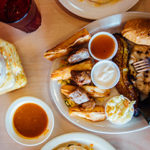I like to cook for friends and family, but I’m not a fan of cooking in front of friends and family. I prefer to have the meal ready to serve when my guests arrive. But a study conducted by researchers at Harvard Business School (HBS) and the University College London suggests that my guests might give my meal higher marks if they watched me prepare it.
An article in the November issue of Harvard Business Review describes how the three researchers set up four scenarios in two weeks in a real cafeteria. In the first, diners and cooks couldn’t view one another; in the second, the diners could see the cooks; in the third, the cooks could see the diners; and in the fourth, both the diners and the cooks were visible to each other. This was accomplished by using iPads and setting up a videoconference between the dining area and the kitchen.
The result? Customer satisfaction with the food increased when the cooks could see the customers — even when the customers couldn’t see the cooks. But when customers and cooks both could see one another, satisfaction shot up more than 17 percent, and service was 13 percent faster.
One of the researchers, Ryan W. Buell, an assistant professor at HBS, theorized why: “We’ve learned that seeing the customer can make employees feel more appreciated, more satisfied with their jobs, and more willing to exert effort. It’s important to note that it wasn’t just the perception of quality that improved — the food objectively got better.”
“This is more about gratitude — which is a powerful force,” said fellow researcher Tami Kim, a doctoral student at HBS. “Cooks constantly said how much they loved seeing their customers. Many wanted to keep the iPad setup. One said: ‘When the customers can see the work, they appreciate it, and it makes me want to improve.'”
How might this dynamic be applied to meetings? While it’s often not possible for cooks to see attendees while preparing their meals, or for attendees to see the chef at work (especially in large-group settings), perhaps at least introducing the head chef and some of the kitchen staff will make the meal more memorable for the group. As Buell said, “Being appreciated makes work meaningful. People feel what they do matters. Human connections seem to trigger that.”




